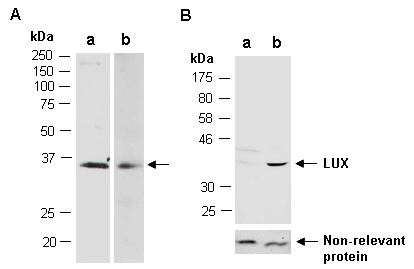Abiocode Logo
Products
Contact Us
- Telephone:
1-818-707-0309 - E-Mail:
Abiocode@Abiocode.com
R1247-1a - LUX (N1) Antibody, Rabbit Polyclonal
|
Quantity: 100 ul Application: WB Predicted I Observed M.W.: 35 kDa Uniprot ID: Q9SNB4 Background: Transcription factor LUX is a transcription factor essential for the generation of the circadian clock oscillation. LUX is necessary for activation of CCA1 and LHY expression. LUX is co-regulated with TOC1 and seems to be repressed by CCA1 and LHY by direct binding of these proteins to the evening element in the LUX promoter. LUX also directly regulates the expression of PRR9, a major component of the morning transcriptional feedback circuit, by binding to the specific sites on PRR9 promoter. LUX binds to its own promoter, inducing a negative auto-regulatory feedback loop within the core clock. LUX also binds to ELF3 and associates with ELF4 in a diurnal complex, which is required for the expression of the growth-promoting transcription factors PIF4 and PIF5 and subsequent hypocotyl growth in the early evening. Other Names: Transcription factor LUX, Protein LUX ARRHYTHMO, Protein PHYTOCLOCK 1, PCL1 Source and Purity: Rabbit polyclonal antibodies were produced by immunizing animals with a GST-fusion protein containing the N-terminal region of arabidopsis thaliana LUX (At3g46640). Antibodies were purified by affinity purification using immunogen. Storage Buffer and Condition: Supplied in 1 x PBS (pH 7.4), 100 ug/ml BSA, 40% Glycerol, 0.01% NaN3. Store at -20 °C. Stable for 6 months from date of receipt. Species Specificity: Arabidopsis thaliana Tested Applications: WB: 1:1,000-1:3,000 (detect endogenous protein*) *: The apparent protein size on WB may be different from the calculated M.W. due to modifications. Product Data:
|
